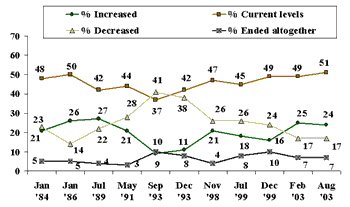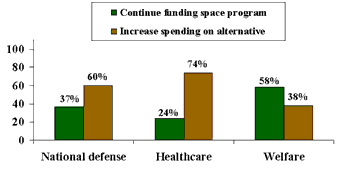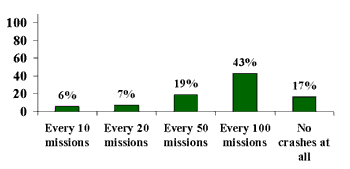GALLUP NEWS SERVICE
PRINCETON, NJ – Last February's space shuttle disaster caused some Americans to question the future of the U.S. space program, and the federal government will soon decide whether it will continue to fund space shuttle missions. A new USA Today/CNN/�鶹��ýAV poll finds support for funding NASA essentially the same as it was shortly after this year's Columbia crash, and high by historical standards. But when given a choice, Americans would prefer to direct money spent on the space program to increased spending on healthcare and national defense (though they prefer funding the space program to increasing welfare). Most Americans find the risk to astronauts' lives an acceptable price to pay for U.S. achievement of space program goals.
According to the poll, conducted Aug. 4-6, 51% of Americans would like to see government spending on NASA kept at its current level, with slightly more preferring increased (24%) to decreased (17%) funding. These percentages are little changed from a poll conducted shortly after the Columbia space shuttle explosion in February, and remain more positive than those measured in previous �鶹��ýAV polls dating back to 1984. In the past, with just a few exceptions, the percentage of Americans favoring cuts in NASA funding has exceeded those favoring an increase. But typically the largest percentage of the public favors maintaining current funding levels.
| Now I'd like to ask you about government spending on NASA. In answering, please bear in mind that sooner or later all government spending has to be taken out of the taxes that you and other Americans pay. Do you think spending on the U.S. space program should be increased, kept at the present level, reduced, or ended altogether? |
 |
Men (32%) are twice as likely as women (16%) to support increased funding for NASA. And support increases with educational attainment – 19% of those with a high school education favor an increase, compared with 24% of those with some college education, 27% of college graduates, and 36% of Americans with a post-graduate education. Older Americans -- those 65 and older -- are half as likely (12%) to support greater spending for NASA than are Americans in all other age groups. There are essentially no differences due to political partisanship or ideology.
When given a choice, however, Americans tend to favor an increase on spending for other purposes over continued funding of the space program. For example, by a 60% to 37% margin, Americans prefer spending additional government money on national defense to continued funding of the space program. By an even larger margin (74% to 24%), the public favors increased spending on healthcare to continued funding of the space exploration. But Americans would rather see government tax dollars continue to go to the space program (58%) than to increased funding for welfare programs (38%).
| Continue NASA Funding, or Increase Spending on… |
 |
| August, 4-6 2003 |
Most Americans Say Risk of Lives Acceptable
Since 1981, the space shuttle program has suffered two fatal crashes in 113 takeoffs, resulting in the deaths of 14 people. After the recent crash of the space shuttle Columbia, some questioned whether the risk of space travel was worth the various scientific benefits. Most Americans appear willing to assume some risk for the United States to achieve its goals with the space program, although the shuttle program's history has proved to be riskier than most Americans say they would accept.
The poll finds about one in three saying a crash every 50 missions is an acceptable price to pay, roughly what the space shuttle program has experienced to date (one crash for every 57 missions). An additional 43% say a crash every 100 missions is acceptable. Only 17% feel that astronauts' lives are never worth risking in order to achieve U.S. goals in space.
| As you may know, there have been two space shuttle crashes that have killed fourteen astronauts since the first space shuttle was launched in 1981. Which of the following would you consider to be an acceptable price to pay for the U.S. to achieve its goals with the space program – a fatal space shuttle crash every ten missions, a fatal space shuttle crash every twenty missions, a fatal space shuttle crash every fifty missions, a fatal space shuttle crash every one hundred missions, or no space shuttle crashes at all? |
 |
| August, 4-6 2003 |
Survey Methods
These results are based on telephone interviews with a randomly selected national sample of 1,003 adults, 18 years and older, conducted August 4-6, 2003. For results based on this sample, one can say with 95 percent confidence that the maximum error attributable to sampling and other random effects is plus or minus 3 percentage points. In addition to sampling error, question wording and practical difficulties in conducting surveys can introduce error or bias into the findings of public opinion polls.
37. Now I'd like to ask you about government spending on NASA. In answering, please bear in mind that sooner or later all government spending has to be taken out of the taxes that you and other Americans pay. Do you think spending on the U.S. space program should be increased, kept at the present level, reduced, or ended altogether?
|
Increased |
Current levels |
Decreased |
Ended altogether |
No |
|
|
% |
% |
% |
% |
% |
|
|
2003 Aug 4-6 |
24 |
51 |
17 |
7 |
1 |
|
2003 Feb 7-9 |
25 |
49 |
17 |
7 |
2 |
|
1999 Dec 9-12 |
16 |
49 |
24 |
10 |
1 |
|
1999 Jul 13-14 |
18 |
45 |
26 |
8 |
3 |
|
1998 Nov 20-22 |
21 |
47 |
26 |
4 |
2 |
|
1993 Dec 17-19 |
11 |
42 |
38 |
8 |
1 |
|
1993 Sep 13-15 |
9 |
37 |
41 |
10 |
3 |
|
1991 May 2-5 |
21 |
44 |
28 |
3 |
4 |
|
1989 Jul 6-9 |
27 |
42 |
22 |
4 |
5 |
|
1986 Jan 29-30 |
26 |
50 |
14 |
5 |
5 |
|
1984 Jan 30-Feb 6 |
21 |
48 |
23 |
5 |
4 |
40. Next we'd like you to think about the money the federal government spends on the U.S. space program. Do you think the government should continue to fund the space program, or would you rather see that money used to increase spending on [RANDOM ORDER]? Next, would you rather the government continue to fund the space program, or would you rather see that money used to increase spending on [INSERT NEXT ITEM]?
A. National defense
|
Continue funding space program |
Increase spending on national defense |
No |
|
|
2003 Aug 4-6 |
37% |
60 |
3 |
B. Healthcare
|
Continue funding space program |
Increase spending on national defense |
No |
|
|
2003 Aug 4-6 |
24% |
74 |
2 |
C. Welfare
|
Continue funding space program |
Increase spending on national defense |
No |
|
|
2003 Aug 4-6 |
58% |
38 |
4 |
41. As you may know, there have been two space shuttle crashes that have killed fourteen astronauts since the first space shuttle was launched in 1981. Which of the following would you consider to be an acceptable price to pay for the U.S. to achieve its goals with the space program – [ROTATED: a fatal space shuttle crash every ten missions, a fatal space shuttle crash every twenty missions, a fatal space shuttle crash every fifty missions, a fatal space shuttle crash every one hundred missions, (or) no space shuttle crashes at all]?
|
Every |
Every |
Every |
Every 100 missions |
No crashes |
|
|
|
2003 Aug 4-6 |
6% |
7 |
19 |
43 |
17 |
8 |
43. To the best of your knowledge, does NASA have – [ROTATED: a larger share of the federal budget than it had ten years ago, the same share it had ten years ago, or a smaller share of the federal budget than it had ten years ago]?
BASED ON –469—NATIONAL ADULTS IN FORM A
|
Larger share |
Same share |
Smaller share |
No opinion |
|
|
2003 Aug 4-6 |
33% |
23 |
29 |
15 |
44. To the best of your knowledge, are there any U.S. astronauts in space right now, or not?
BASED ON –534—NATIONAL ADULTS IN FORM B
|
Yes, are |
No, are not |
No opinion |
|
|
2003 Aug 4-6 |
35% |
50 |
15 |
